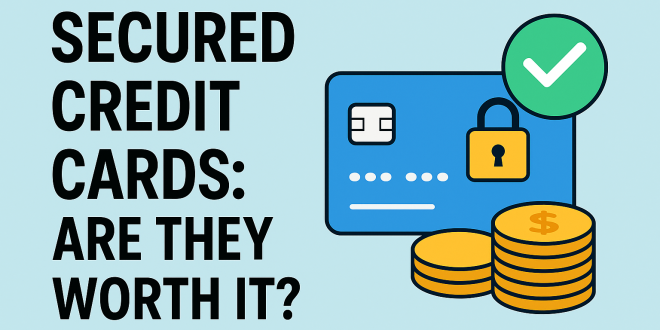Secured Credit Cards: Are They Worth It? (Ultimate Beginner’s Guide)
✅ Table of Contents
- Introduction
- What is a Secured Credit Card?
- How Do Secured Credit Cards Work?
- Who Should Consider a Secured Credit Card?
- Secured vs. Unsecured Credit Cards
- Pros and Cons of Secured Credit Cards
- How to Choose the Best Secured Credit Card
- Steps to Apply for a Secured Credit Card
- Tips to Use Your Secured Credit Card Wisely
- How Long Should You Keep a Secured Card?
- Real-Life Use Cases: Who Benefited from Secured Cards?
- Frequently Asked Questions (FAQs)
- Final Verdict: Are Secured Credit Cards Worth It?
🔹 1. Introduction
Do you have bad or no credit history? Have you been denied credit cards before? You’re not alone. Millions of people are stuck in a credit catch-22 — you need credit to build credit. That’s where secured credit cards come in.
This guide will break down everything you need to know about secured credit cards and help you decide whether it’s the right financial step for you.
🔹 2. What is a Secured Credit Card?
A secured credit card is a type of credit card that requires a refundable security deposit to open. This deposit acts as collateral and typically determines your credit limit.
For example, if you deposit $300, your credit limit is usually $300.
Unlike prepaid cards, secured cards report to credit bureaus, helping you build or rebuild credit over time.
🔹 3. How Do Secured Credit Cards Work?
Here’s how it works:
- 🔐 Security Deposit: You provide a cash deposit upfront.
- 💳 Credit Limit: Your limit = your deposit (mostly).
- 🧾 Monthly Statements: You receive monthly bills like a regular card.
- 📈 Credit Reporting: Activity is reported to the major credit bureaus (Equifax, Experian, TransUnion).
As long as you use it responsibly — paying on time and keeping utilization low — your credit score can improve.
🔹 4. Who Should Consider a Secured Credit Card?
Secured credit cards are ideal for:
- People with no credit history
- Those with a low or bad credit score
- Students or recent immigrants
- Anyone who’s been denied traditional cards
If your goal is to build trust with credit bureaus and establish a solid credit history, a secured card is often the safest starting point.
🔹 5. Secured vs. Unsecured Credit Cards
| Feature | Secured Credit Card | Unsecured Credit Card |
|---|---|---|
| Deposit Required | ✅ Yes | ❌ No |
| Credit Limit | Based on deposit | Based on creditworthiness |
| Easier to Get? | ✅ Yes | ❌ Harder |
| Credit Building? | ✅ Yes | ✅ Yes |
| Ideal For | Beginners, Rebuilders | Good credit holders |
🔍 Secured cards are for stepping stones, not long-term use.
🔹 6. Pros and Cons of Secured Credit Cards
✅ Pros:
- Easy approval
- Helps build/rebuild credit
- Reports to credit bureaus
- Can upgrade to unsecured card
- Lower risk of overspending
❌ Cons:
- Requires upfront deposit
- Higher interest rates
- Low starting credit limits
- Some cards charge annual fees
Tip: Always choose a secured card with no annual fee and full credit reporting.
🔹 7. How to Choose the Best Secured Credit Card
Here’s what to look for:
✅ No or low annual fees
✅ Reports to all 3 credit bureaus
✅ Refundable deposit
✅ Possibility to upgrade
✅ Reasonable APR
✅ Mobile app & online tracking
Some popular options (for global readers):
- Discover it® Secured Credit Card
- Capital One Platinum Secured
- OpenSky® Secured Visa
🔹 8. Steps to Apply for a Secured Credit Card
- Check your credit score. (Even if it’s low.)
- Compare offers online.
- Apply directly on the provider’s site.
- Make your security deposit.
- Receive and activate your card.
- Start using it responsibly.
🔁 If rejected, don’t reapply immediately — try to understand why and improve your credit first.
🔹 9. Tips to Use Your Secured Credit Card Wisely
- 💡 Always pay on time — missed payments hurt.
- 💡 Keep credit utilization below 30%.
- 💡 Don’t max it out — stay disciplined.
- 💡 Use the card monthly to show activity.
- 💡 Set up auto-payments to avoid fees.
- 💡 After 6–12 months, request a review to upgrade or get your deposit back.
🔹 10. How Long Should You Keep a Secured Card?
Ideally, keep it:
- 🕒 At least 6–12 months to build history
- 🕒 Until your credit score hits 600–650+
- 🕒 Or until you qualify for an unsecured upgrade
⚠️ Don’t close your first card too early — length of credit history is important for your score.
🔹 11. Real-Life Use Cases: Who Benefited from Secured Cards?
🔸 Case 1: Maria (Age 23)
Just moved to the U.S. from Brazil, used a $500 deposit card. In 9 months, upgraded to a regular card with no deposit.
🔸 Case 2: Jamal (Age 31)
Bankruptcy 2 years ago. Used a secured card to rebuild score from 480 to 670 in 12 months.
🔸 Case 3: Sarah (Age 19)
College freshman with no credit. Used her card to build early credit and now pays $0 deposit after 1 year.
🔹 12. Frequently Asked Questions (FAQs)
Q: Can I get my deposit back?
✅ Yes, when you close the account or upgrade (if no outstanding balance).
Q: Do secured cards charge interest?
✅ Yes — treat them like regular credit cards.
Q: How much should I deposit?
🔁 Start with what you can afford — $200 to $500 is common.
Q: Will it hurt my credit to apply?
✅ There may be a small temporary drop from the hard inquiry.
Q: Can I get more than one secured card?
✅ Yes, but start with one to build responsibly.
🔹 13. Final Verdict: Are Secured Credit Cards Worth It?
If you’re looking to build or repair your credit and don’t qualify for traditional cards, secured credit cards are absolutely worth it.
They provide a low-risk, high-reward opportunity to prove your creditworthiness. Just remember: it’s not about spending, it’s about managing. Use it right, and you’ll open the door to better financial tools in no time.
 TheFinanceLift Lift Your Finances, One Step at a Time
TheFinanceLift Lift Your Finances, One Step at a Time

